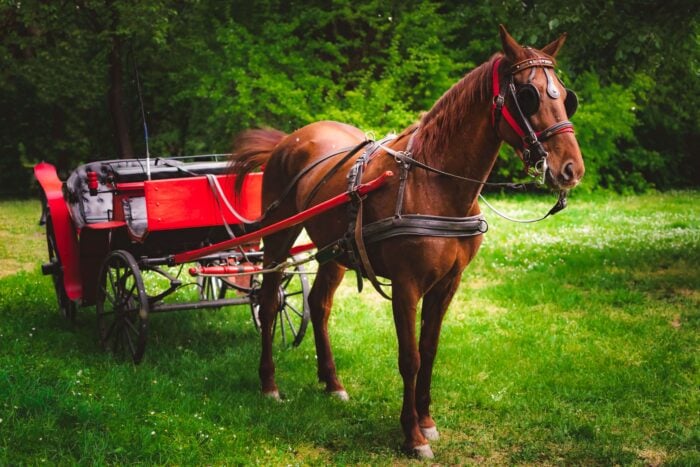9 Polish Idioms That Sound Odd for English Speakers but Poles Love to Use!
The English language is full of expressions whose literal meaning can be a bit confusing for foreign visitors. While “cool as a cucumber” or “thick as thieves” make perfect sense for a Brit, non-native speakers might have a hard time trying to understand what we mean when we use these phrases.
This doesn’t mean, of course, that we are the only ones who use this type of phrase! The Polish language is also full of colloquial expressions whose literal translation could be misleading.
→Sign Up Now: Free Trial Polish Lesson With a Native Speaker Teacher!←
Below, you will find some of the funniest, weirdest Polish idioms we have found. Want to know what they mean and how they translate to English? Let’s find out.
Table of Contents
1. Nie wywołuj wilka z lasu – Don’t call the wolf from the forest.
2. Nie mój cyrk, nie moje małpy – Not my circus, not my monkeys
3. Kiedy wszedłeś między wrony, musisz krakać jak i one – When among the crows, caw as the crows do
4. Co ma piernik do wiatraka? – What does gingerbread have to do with a windmill?
5. Rzucać grochem o ścianę – Throwing peas against a wall
6. Bułka z masłem – It’s a roll with butter
7. Mieć muchy w nosie – Flies up your nose
8. Co ma wisieć, nie utonie – What is supposed to hang, won’t drown!
9. Pasować jak wół do karety – This goes together like an ox and a carriage
1. Nie wywołuj wilka z lasu – Don’t call the wolf from the forest.
If we stopped to think about the most dangerous things a person can do, calling a wolf from the forest would probably make the top 5.
So, no matter where you are from or what language you speak, doing that would just be like tempting fate, wouldn’t it?
Well, that’s exactly what this Polish idiom means: don’t do that very risky (and highly unnecessary) thing! Just be like the Poles; don’t tempt fate!
2. Nie mój cyrk, nie moje małpy – Not my circus, not my monkeys
Imagine you left your children with their grandparents for a rare weekend getaway. You’re sunbathing by the pool when you see your friends’ children running and shouting all over the place.
Yes, you should probably do something, but you can’t be bothered. Instead, you just look at your wife, you shrug, and you say: not my circus, not my monkeys, i.e., not my problem.
3. Kiedy wszedłeś między wrony, musisz krakać jak i one – When among the crows, caw as the crows do
Learning Polish idioms can be a great opportunity to learn about Polish culture. So let’s take that opportunity and talk about customs.
Of all the unique traditions that Poles have, eating open sandwiches is one of the most curious ones. The Polish sandwich, called kanapki, dates back to medieval times, when hungry Poles would use a thick piece of bread as a plate and then eat it.
Imagine, then, that you are in a park in Kraków eating a sandwich the British way, when you see that everyone around you is eating open kanapki.
Since you really want to mingle, you can look at your friend and say: when among the crow, caw as the crows do. Then you just take the top of both your sandwiches and put them away.
4. Co ma piernik do wiatraka? – What does gingerbread have to do with a windmill?
This might be one the most effective, though not the friendliest, Polish idioms. It’s a curious little phrase that you can use to warn someone that what they’ve just said is irrelevant or has no connection to the subject you are discussing.
For example:
“I’m so heartbroken!”
“Well, at least your hair looks great today”
“What does gingerbread have to do with a windmill?”
5. Rzucać grochem o ścianę – Throwing peas against a wall
Have you ever tried to talk sense into someone who was too stubborn or arrogant to admit they were in the wrong? Then, you know the feeling.
When people are so caught up in their own mindset, talking to them can be as useless as throwing peas against a wall.
Polish idioms might be phrased differently from their English counterparts, but the situations in which they are used are definitely familiar!
6. Bułka z masłem – It’s a roll with butter
Polish idioms can be a bit confounding. I mean, who would think that “roll with butter” means easy? Isn’t it more natural to say that something is “a piece of cake”?
Well, that’s the thing. There isn’t anything in the phrase “a piece of cake” that screams “easy” either. It’s just that we learnt to associate that phrase with a particular concept from a very early age.
We hope, one day, you will become so proficient in Polish that Polish idioms will come to you as easily as their English counterparts!
7. Mieć muchy w nosie – Flies up your nose
I don’t know about you, but one of the most infuriating things for me is having my sleep interrupted by one of those fat, nosy flies that are so common on hot summer nights.
If, like me, you find passing flies annoying, imagine having one up your nose.
Now that would be infuriating.
This Polish idiom is used to talk about things that make you really angry. So, what has a “fly up my nose” effect for you?
8. Co ma wisieć, nie utonie – What is supposed to hang, won’t drown!
Are you one of those people who think that what is bound to happen will happen no matter what you do to prevent it? This Polish idiom will be super helpful, then!
You can use it every time someone warns you against trying something risky to make them see that our fate has already been decided.
Example:
“Please, stay close to the shore! The waves look dangerous today.”
“Don’t worry, Mom, what is supposed to hang, won’t drown!”
9. Pasować jak wół do karety – This goes together like an ox and a carriage
A few Polish idioms on this list can seem a bit odd, but you have to admit this one makes a lot of sense.
Saying that something goes together like an ox and a carriage means that something is a terrible combination. You know, like a fist and a nose, or a child and a pair of scissors. They just don’t match!
So, there you are. That’s our list of weird, funny idioms that you should memorise before travelling to Poland or going to a party at your Polish friends’ house.
Besides providing a fun way to acquire new vocabulary, Polish idioms will help you to communicate more naturally with Poles. If communication is your goal, we strongly suggest you take a private course with one of our native Polish teachers so you can continue learning about Polish colloquial expressions and how to use them in real conversations!
→Sign Up Now: Free Trial Polish Lesson With a Native Speaker Teacher!←
Our expert native Polish teachers will design a curriculum tailored to your needs and will help you reach your objectives in the most effective way. Contact us now and get a Free Trial Polish Class, where you’ll be able to meet your teacher, assess your current level, and learn more about our methodology.



